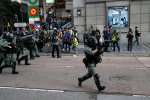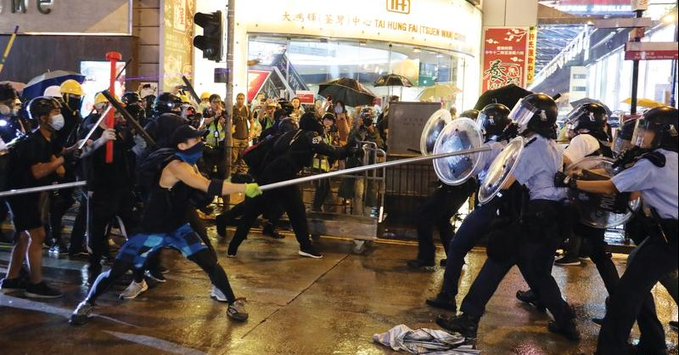jward
passin' thru
Links at source.....
Posted for fair use.....
https://mobile.reuters.com/article/amp/idUSKBN1Y50VM?__twitter_impression=true
Hong Kong police fire tear gas to disperse anti-government protesters
(Reuters) - Hong Kong police fired tear gas to disperse anti-government protesters on Sunday as thousands took to the streets of the Chinese-ruled city after a rare lull in violence.
The protest, which took place in the bustling shopping district of Tsim Tsa Tsui, came after hundreds of people had marched to the U.S. consulate to show "gratitude" for U.S. support for the demonstrations that have roiled the China-ruled financial hub for nearly six months. [L4N28B02W]
(Reporting By Hong Kong Newsroom; Writing by Anne Marie Roantree; Editing by Tom Hogue)
Posted for fair use.....
https://mobile.reuters.com/article/amp/idUSKBN1Y50VM?__twitter_impression=true
.
Reuters
@Reuters
·
3m
Hong Kong police fire tear gas to disperse anti-government protesters https://reut.rs/33EMczE
Hong Kong police fire tear gas to disperse anti-government protesters
(Reuters) - Hong Kong police fired tear gas to disperse anti-government protesters on Sunday as thousands took to the streets of the Chinese-ruled city after a rare lull in violence.
The protest, which took place in the bustling shopping district of Tsim Tsa Tsui, came after hundreds of people had marched to the U.S. consulate to show "gratitude" for U.S. support for the demonstrations that have roiled the China-ruled financial hub for nearly six months. [L4N28B02W]
(Reporting By Hong Kong Newsroom; Writing by Anne Marie Roantree; Editing by Tom Hogue)
Hong Kong police arresting medical volunteers, more: http://www.timebomb2000.com/vb/show...cal-volunteers-more....&highlight=Hong+kong
11-17-2019 11:39 AM mzkitty
11-19-2019 12:24 PM Dozdoets
Getting On The Trains In Hong Kong (Camps Just A Short Trip Away):
http://www.timebomb2000.com/vb/show...s-Just-A-Short-Trip-Away)&highlight=Hong+kong
Attachments
Last edited:





